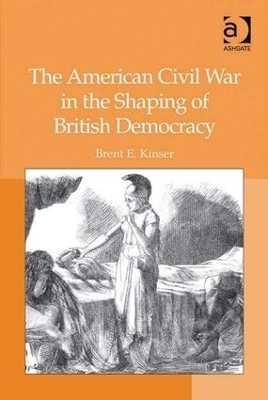
The American Civil War in the Shaping of British Democracy
Seiten
2011
Routledge (Verlag)
978-0-7546-6095-8 (ISBN)
Routledge (Verlag)
978-0-7546-6095-8 (ISBN)
When the American Civil War broke out in 1861, a central question for British intellectuals was whether or not the American conflict was proof of the viability of democracy as a foundation for the governance. This title considers four figures connected by Woodrow Wilson's concept of the 'Literary Politician.'
When the American Civil War broke out in 1861, a central question for British intellectuals was whether or not the American conflict was proof of the viability of democracy as a foundation for modern governance. The lessons of the American Civil War for Britain would remain a focal point in the debate on democracy throughout the war up to the suffrage reform of 1867, and after. Brent E. Kinser considers four figures connected by Woodrow Wilson's concept of the "Literary Politician," a person who, while possessing a profound knowledge of politics combined with an equally acute literary ability to express that knowledge, escapes the practical drudgeries of policy making. Kinser argues that the animosity of Thomas Carlyle towards democracy, the rhetorical strategy of Anthony Trollope's North America, the centrality of the American war in Walter Bagehot's vision of British governance, and the political philosophy of John Stuart Mill illustrate the American conflict's vital presence in the debates leading up to the 1867 reform, a legislative event that helped to secure democracy's place in the British political system.
When the American Civil War broke out in 1861, a central question for British intellectuals was whether or not the American conflict was proof of the viability of democracy as a foundation for modern governance. The lessons of the American Civil War for Britain would remain a focal point in the debate on democracy throughout the war up to the suffrage reform of 1867, and after. Brent E. Kinser considers four figures connected by Woodrow Wilson's concept of the "Literary Politician," a person who, while possessing a profound knowledge of politics combined with an equally acute literary ability to express that knowledge, escapes the practical drudgeries of policy making. Kinser argues that the animosity of Thomas Carlyle towards democracy, the rhetorical strategy of Anthony Trollope's North America, the centrality of the American war in Walter Bagehot's vision of British governance, and the political philosophy of John Stuart Mill illustrate the American conflict's vital presence in the debates leading up to the 1867 reform, a legislative event that helped to secure democracy's place in the British political system.
Brent E. Kinser is Associate Professor of English at Western Carolina University.
Contents: Introduction: trial of the century; Thomas Carlyle: the accidental democrat; Anthony Trollope: strange paradoxes; Walter Bagehot: the case against America; John Stuart Mill: calculations and feelings; Conclusion: 'Fare-well' democracy; Bibliography; Index.
| Erscheint lt. Verlag | 28.3.2011 |
|---|---|
| Verlagsort | London |
| Sprache | englisch |
| Maße | 156 x 234 mm |
| Gewicht | 521 g |
| Themenwelt | Geisteswissenschaften ► Geschichte ► Regional- / Ländergeschichte |
| Geschichte ► Teilgebiete der Geschichte ► Militärgeschichte | |
| Geisteswissenschaften ► Sprach- / Literaturwissenschaft ► Anglistik / Amerikanistik | |
| Geisteswissenschaften ► Sprach- / Literaturwissenschaft ► Literaturgeschichte | |
| ISBN-10 | 0-7546-6095-8 / 0754660958 |
| ISBN-13 | 978-0-7546-6095-8 / 9780754660958 |
| Zustand | Neuware |
| Haben Sie eine Frage zum Produkt? |
Mehr entdecken
aus dem Bereich
aus dem Bereich
neueste Manipulationstechniken als Waffengattung der NATO
Buch | Softcover (2023)
Westend (Verlag)
24,00 €
Deutschlands Schwäche in der Zeitenwende
Buch | Softcover (2023)
C.H.Beck (Verlag)
18,00 €


